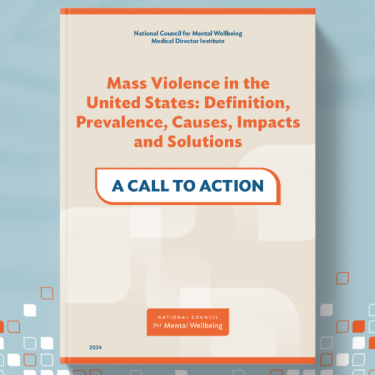June 25, 2022 – The National Council for Mental Wellbeing applauds Congress for passing the Bipartisan Safer Communities Act, legislation to dramatically increase funding for mental health programs and reduce the threat and incidence of violence in America.
President Biden signed the bill into law on Saturday, June 26.
Originally introduced by Sens. Chris Murphy (D-Conn.) and John Cornyn (R-Texas), the bill provides funding to increase access to comprehensive mental health and substance use services, notably through expanding Certified Community Behavioral Health Clinics (CCBHCs). Since 2017, CCBHCs have provided critical and lifesaving care for people with mental health and substance use challenges, expanding access to care for millions of people. The bill also includes aid to broaden access to telehealth services and mental health awareness programs such as Mental Health First Aid (MHFA) and provides additional funding for the National Suicide Prevention Lifeline ahead of the 988 implementation date in July.
“This new law will forever change how people access mental health and substance use treatment in their communities. Expanding Certified Community Behavioral Health Clinics (CCBHCs) nationwide is transformational and will dramatically expand access to comprehensive and lifesaving services while helping support and grow the behavioral health workforce.”
Chuck Ingoglia, president and CEO of the National Council for Mental Wellbeing
“Increased funding for mental health awareness training programs and the National Suicide Prevention Lifeline will help save lives and provide much needed support to strengthen the capacity of our crisis care system,” continued Ingoglia. “This is especially critical as people nationwide will soon be able to access the Lifeline more easily through a new three-digit dialing code, 988. We applaud Congress for their bipartisan leadership in expanding access to lifesaving mental health and substance use services, and thank President Biden for swiftly signing the Bipartisan Safer Communities Act into law.”
CCBHCs are clinics that offer an expanded range of services – including 24/7 access and crisis services – to anyone who walks in the door, regardless of their ability to pay. Long championed by Sens. Debbie Stabenow (D-Mich.) and Roy Blunt (R-Mo.) and the National Council, CCBHCs are transforming access to lifesaving mental health and substance use services in communities nationwide.
Originally set up in in eight states through a Medicaid demonstration (with two states added shortly thereafter), CCBHCs have increased access to mental health and substance use disorder treatment, reduced wait times and hospitalizations, reduced homelessness, expanded states’ capacity to address the overdose crisis and established innovative partnerships with law enforcement, schools and hospitals to improve care, reduce recidivism and prevent hospital readmissions.
Details of the Bipartisan Safer Communities Act
The Bipartisan Safer Communities Act would expand CCBHCs by allowing any state or territory the opportunity to apply to participate in the demonstration program, while allocating additional planning grant monies for states to develop proposals to participate.
Additional key items included in the bill include:
- $120 million in funding for Mental Health Awareness Training.
- $150 million in funding for the National Suicide Prevention Lifeline for fiscal year 2022.
- Provisions requiring the Centers for Medicare and Medicaid Services (CMS) to provide guidance to states on how they can increase access to care via telehealth under Medicaid and CHIP, including strategies related to training and providing resources for providers and patients.
- Factsheet: What is a CCBHC?
- Factsheet: CCBHC Funding Streams
- Factsheet: CCBHCs and Youth Mental Health
- Report: 2021 CCBHC State Impact Report
- Report: CCBHCs and Justice Systems
- CCBHCs and Crisis Response Systems
About The National Council
Founded in 1969, the National Council for Mental Wellbeing is a membership organization that drives policy and social change on behalf of over 3,400 mental health and substance use treatment organizations and the more than 10 million children, adults and families they serve. We advocate for policies to ensure equitable access to high-quality services. We build the capacity of mental health and substance use treatment organizations. And we promote greater understanding of mental wellbeing as a core component of comprehensive health and health care. Through our Mental Health First Aid (MHFA) program, we have trained more than 4 million people in the U.S. to identify, understand and respond to signs and symptoms of mental health and substance use challenges.



